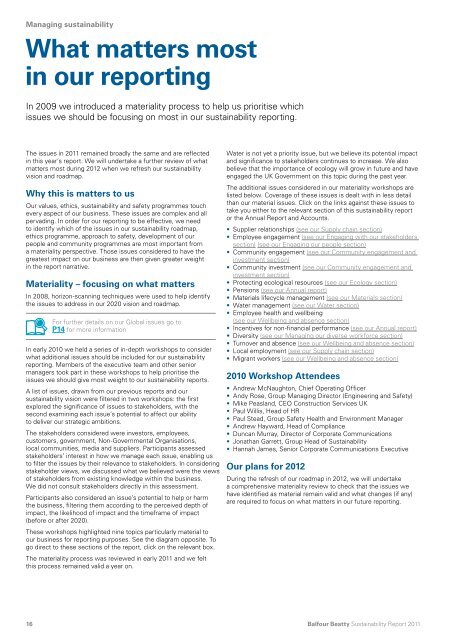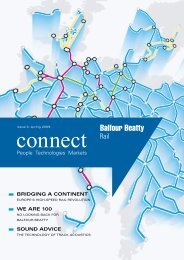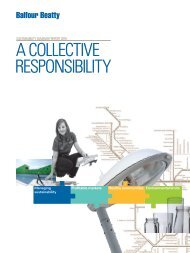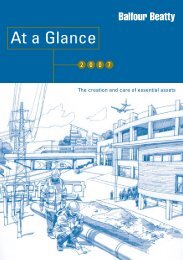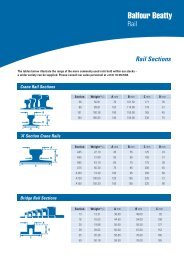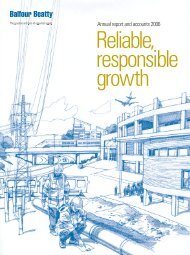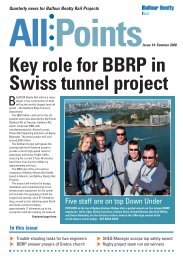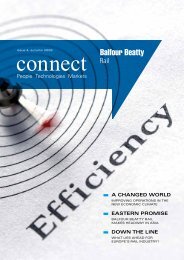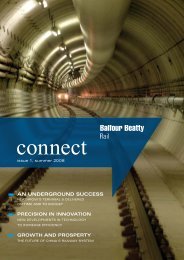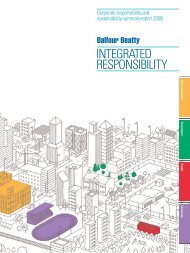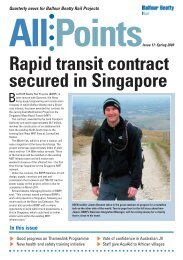Sustainability Report 2011 - Balfour Beatty Rail
Sustainability Report 2011 - Balfour Beatty Rail
Sustainability Report 2011 - Balfour Beatty Rail
Create successful ePaper yourself
Turn your PDF publications into a flip-book with our unique Google optimized e-Paper software.
Managing sustainability<br />
What matters most<br />
in our reporting<br />
In 2009 we introduced a materiality process to help us prioritise which<br />
issues we should be focusing on most in our sustainability reporting.<br />
The issues in <strong>2011</strong> remained broadly the same and are reflected<br />
in this year’s report. We will undertake a further review of what<br />
matters most during 2012 when we refresh our sustainability<br />
vision and roadmap.<br />
Why this is matters to us<br />
Our values, ethics, sustainability and safety programmes touch<br />
every aspect of our business. These issues are complex and all<br />
pervading. In order for our reporting to be effective, we need<br />
to identify which of the issues in our sustainability roadmap,<br />
ethics programme, approach to safety, development of our<br />
people and community programmes are most important from<br />
a materiality perspective. Those issues considered to have the<br />
greatest impact on our business are then given greater weight<br />
in the report narrative.<br />
Materiality – focusing on what matters<br />
In 2008, horizon-scanning techniques were used to help identify<br />
the issues to address in our 2020 vision and roadmap.<br />
For further details on our Global issues go to<br />
P14 for more information<br />
In early 2010 we held a series of in-depth workshops to consider<br />
what additional issues should be included for our sustainability<br />
reporting. Members of the executive team and other senior<br />
managers took part in these workshops to help prioritise the<br />
issues we should give most weight to our sustainability reports.<br />
A list of issues, drawn from our previous reports and our<br />
sustainability vision were filtered in two workshops: the first<br />
explored the significance of issues to stakeholders, with the<br />
second examining each issue’s potential to affect our ability<br />
to deliver our strategic ambitions.<br />
The stakeholders considered were investors, employees,<br />
customers, government, Non-Governmental Organisations,<br />
local communities, media and suppliers. Participants assessed<br />
stakeholders’ interest in how we manage each issue, enabling us<br />
to filter the issues by their relevance to stakeholders. In considering<br />
stakeholder views, we discussed what we believed were the views<br />
of stakeholders from existing knowledge within the business.<br />
We did not consult stakeholders directly in this assessment.<br />
Participants also considered an issue’s potential to help or harm<br />
the business, filtering them according to the perceived depth of<br />
impact, the likelihood of impact and the timeframe of impact<br />
(before or after 2020).<br />
These workshops highlighted nine topics particularly material to<br />
our business for reporting purposes. See the diagram opposite. To<br />
go direct to these sections of the report, click on the relevant box.<br />
The materiality process was reviewed in early <strong>2011</strong> and we felt<br />
this process remained valid a year on.<br />
16<br />
Water is not yet a priority issue, but we believe its potential impact<br />
and significance to stakeholders continues to increase. We also<br />
believe that the importance of ecology will grow in future and have<br />
engaged the UK Government on this topic during the past year.<br />
The additional issues considered in our materiality workshops are<br />
listed below. Coverage of these issues is dealt with in less detail<br />
than our material issues. Click on the links against these issues to<br />
take you either to the relevant section of this sustainability report<br />
or the Annual <strong>Report</strong> and Accounts.<br />
• Supplier relationships (see our Supply chain section)<br />
• Employee engagement (see our Engaging with our stakeholders<br />
section) (see our Engaging our people section)<br />
• Community engagement (see our Community engagement and<br />
investment section)<br />
• Community investment (see our Community engagement and<br />
investment section)<br />
• Protecting ecological resources (see our Ecology section)<br />
• Pensions (see our Annual report)<br />
• Materials lifecycle management (see our Materials section)<br />
• Water management (see our Water section)<br />
• Employee health and wellbeing<br />
(see our Wellbeing and absence section)<br />
• Incentives for non-financial performance (see our Annual report)<br />
• Diversity (see our Managing our diverse workforce section)<br />
• Turnover and absence (see our Wellbeing and absence section)<br />
• Local employment (see our Supply chain section)<br />
• Migrant workers (see our Wellbeing and absence section)<br />
2010 Workshop Attendees<br />
• Andrew McNaughton, Chief Operating Officer<br />
• Andy Rose, Group Managing Director (Engineering and Safety)<br />
• Mike Peasland, CEO Construction Services UK<br />
• Paul Willis, Head of HR<br />
• Paul Stead, Group Safety Health and Environment Manager<br />
• Andrew Hayward, Head of Compliance<br />
• Duncan Murray, Director of Corporate Communications<br />
• Jonathan Garrett, Group Head of <strong>Sustainability</strong><br />
• Hannah James, Senior Corporate Communications Executive<br />
Our plans for 2012<br />
During the refresh of our roadmap in 2012, we will undertake<br />
a comprehensive materiality review to check that the issues we<br />
have identified as material remain valid and what changes (if any)<br />
are required to focus on what matters in our future reporting.<br />
<strong>Balfour</strong> <strong>Beatty</strong> <strong>Sustainability</strong> <strong>Report</strong> <strong>2011</strong>


